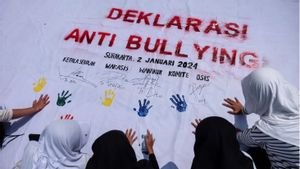JAKARTA Elections are challenging moments for all those involved in political contestation. Not only those who fight on ballot paper, supporters also have the potential to experience stress when their champion gets results that don't match expectations.
The results of quick count or quick count of a number of survey institutions show that the pair of presidential and vice presidential candidates Prabowo Subianto-Gibran Rakabuming Raka is far superior to his two competitors Anies Baswedan-Muhaimin Iskandar and Ganjar Pranowo-Mahfud MD.
As of Wednesday (21/2/2024), the General Election Commission's real count (KPU) also showed that candidate pair 02 was superior by obtaining 58.77 percent of the votes, out of 73.37 percent of the ballots that came in.
In the midst of Prabowo's joy, and his supporters, of course, many parties did not gracefully accept the election results. Allegations of cheating continued to echo even shortly after the quick count results appeared on February 14.
Allegations of cheating from the losers to the winners are not the only time this has happened. At least in the previous two elections, the noise of the supporters who lost often colored the news.
Feelings of difficulty accepting defeats actually do not only occur in the Election season. In various matches as well as competitions, defeats inevitably cause disappointment and that is a natural thing.
However, according to clinical psychologist Lita Gading, it is difficult to accept the rooted defeat of parenting in the past. Demands to always win in every race or get ranked first in schools that occur continuously affect a person to be less mature in thinking, including difficulty accepting defeats.
The parenting pattern of parents in the past has influenced a person to be less mature in thinking. Adults are not only seen from age, but behavior, way of thinking, and so on," said Lita Gading while talking to VOI.
"How is the form of parenting in the past, how education is applied, in the end determines how one is to be competitive, learn to accept defeat with relief," he added.
Lita Gading explained that a person's maturity is not instantaneous. It is necessary to practice repeatedly starting from parenting. He also added that someone who has difficulty accepting defeat is due to a lack of self-conceptual processes.
Moreover, in Indonesia defeat is often labeled as a disgrace, as a shame. Whereas children should have been taught from an early age that in playing, winning and losing are common.
People who do not accept defeat are a form of arrogance of that person. Mindset accepts this defeat has not been trained since childhood," said Lita Gading again.
"Disadvantage is not something bad, but to accept it it requires training since childhood. Because losing an adult will be difficult to train, "he added.
Social Psychology expert from the University of Indonesia Dicky C. Pelupessy said managing the mind is the key for those who feel stressed and disappointed after the election. This does not only apply to supporters, but also legislative candidates who do not get results according to expectations.
SEE ALSO:
"It can start like this, yes. For example, with the understanding that his name is participating in a competition, yes, there is a possibility of winning, there is a possibility of losing. That's one example that what is done is managing our minds," said Dicky, quoted by Antara.
The simple formula is to manage thoughts and stabilize emotions. It may be difficult because it is still warm, but try not to open news or social media so that the disappointment and stress slowly subside. The point is then that feeling, we stabilize it," he said.
Furthermore, Lita Gading does not deny the potential for stress or depression for those who find it difficult to accept defeat.
There must be that possibility, because hope and reality are not comparable so it can be stressful. Basically, stress is when there is great hope but what happens doesn't match reality," he concluded.
The same thing was also expressed by a special practitioner for mental medicine at the Abepura Regional Mental Hospital, Manoe Bernd Paul. He did not deny that the pressure of the election had an effect on a person's psyche. In addition, doctor Bernd Manoe also assessed that fanatical voters are at greater risk of experiencing stress than rational voters. This happens because many of those who have become hardline supporters tend to be more easily stimulated by their emotions when their choices are criticized or attacked.
On the other hand, psychologist from Parahyangan University, Ignatia Ria Natalia, explained that fanatical supporters tend to have greater hopes for idolized figures. In fact, not infrequently, they even consider their idol figures to be like holy people.
These fanatical supporters are at risk of experiencing uncontrollable anxiety because their entire energy is drained of attention to their heroes.
"The fanatical supporters can be vulnerable to depression, be depressed if, for example, the person he supports loses, then accepts blasphemy, especially accepts blasphemy on social media and he is not ready for that," said Ignatia.
"Actually, what became chaotic was not about the candidate pair, but the fanatical supporters who caused the real chaos," explained Ignatia.
The English, Chinese, Japanese, Arabic, and French versions are automatically generated by the AI. So there may still be inaccuracies in translating, please always see Indonesian as our main language. (system supported by DigitalSiber.id)


















